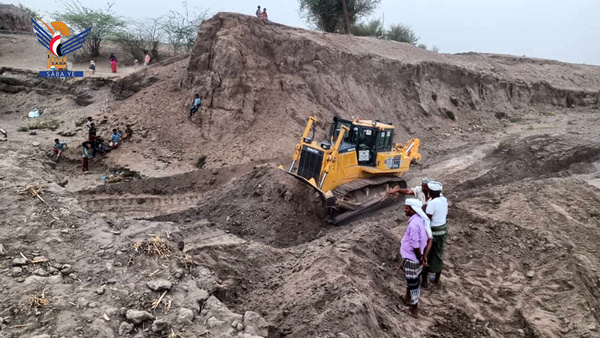
Hodeida - Saba:
Al-Jarrahi Multipurpose Agricultural Cooperative in Hodeida province launched a field initiative on Tuesday to rehabilitate farmlands and irrigation channels damaged by recent floods in the villages of al-Jarahzi and Maqam al-Ma‘bar in al-Mu‘asilah area in al-Jarrahi district.
The initiative, carried out in cooperation with the Community Initiatives Unit in the province, aims to restore productive farmland by supplying diesel fuel to operate agricultural machinery and begin excavation, leveling, and damage repair.
Hodeida undersecretary for Southern Districts Mutahhar al-Hadi said the initiative reflects the directives of the revolutionary and political leadership to support the agricultural front and empower local cooperatives to address economic challenges through enhanced domestic production and self-sufficiency.
He noted that rehabilitating the damaged lands and channels would improve agricultural productivity, ensure the continuity of staple crop cultivation, and reduce dependence on imports—strengthening national food security.
The cooperative’s leadership affirmed continued efforts in coordination with relevant authorities to expand the initiative and provide the necessary technical and logistical support to farmers as part of an integrated development program promoting sustainable agriculture in Tihamah.
Al-Jarrahi Multipurpose Agricultural Cooperative in Hodeida province launched a field initiative on Tuesday to rehabilitate farmlands and irrigation channels damaged by recent floods in the villages of al-Jarahzi and Maqam al-Ma‘bar in al-Mu‘asilah area in al-Jarrahi district.
The initiative, carried out in cooperation with the Community Initiatives Unit in the province, aims to restore productive farmland by supplying diesel fuel to operate agricultural machinery and begin excavation, leveling, and damage repair.
Hodeida undersecretary for Southern Districts Mutahhar al-Hadi said the initiative reflects the directives of the revolutionary and political leadership to support the agricultural front and empower local cooperatives to address economic challenges through enhanced domestic production and self-sufficiency.
He noted that rehabilitating the damaged lands and channels would improve agricultural productivity, ensure the continuity of staple crop cultivation, and reduce dependence on imports—strengthening national food security.
The cooperative’s leadership affirmed continued efforts in coordination with relevant authorities to expand the initiative and provide the necessary technical and logistical support to farmers as part of an integrated development program promoting sustainable agriculture in Tihamah.